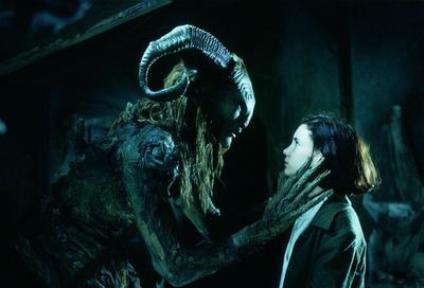ORLEANS
We are enow yet living in the field
To smother up [these items] in our [boxes],
If any order might be thought upon.
BOURBON
The devil take order now!
- Henry V
Chaos! Dust and disaster! A wall of boxes rises ever higher! I hear the bugle sounding in the blogosphere, but I am hemmed in. I cannot enter the fray.
Fortunately, a new champion has risen in my stead. A good man stands in the gap. I present to you... America's Young Theologian. Are there other would be-fighters? Send me your insignia quickly, but keep in mind that only the bravest men will pass muster. And now all warfare metaphors shall cease. Please pardon the non sequitor that is about to occur.
Enjoy the movie review. :) - Ariel
::

"I consider Children of Men, Pan's Labyrinth, and Babel sister films, three films that speak about similar themes. I think that the theme of ideology as a world between the communication of people is a common theme of the three films."--Alfonso Cuaron, director of "Children of Men."
Guillermo del Toro sets Pan's Labyrinth in 1944 Spain, and like The Lion, The Witch, and the Wardrobe, has a militaristic point of departure for his fantasy. However, Pan's Labyrinth (El Laberinto del Fauno) never actually departs from this situation. Del Toro's fantasy follows a little girl, Ofelia, as she travels with her pregnant mother to live with her mother's new husband, a harsh man and a captain in Franco's military, in a mountainous rural area of northern Spain. The story weaves her fantasy world - full of fairies, fauns, and magic - with the oppression of the post-war Fascist regime.
Pan's Labyrinth is not a movie for children and one would hope that the viewing public realizes that fantasy and fairy tales need not be a child's affair. With a dark film like Pan's Labyrinth there is the worry that some of the uncomfortably violent scenes would be seen by children, but also that adults would dismiss this as child's play and not see what is a fantastic film.  One should remember that fantasy in the end may be more real than a reality that is painted by philosophical and biological materialism. Having already mentioned the Narnia film that came out in 2005, one need only compare the representations of a faun to realise that with del Toro the audience is not in Lewis' quaint wonderland. Cinematically, del Toro would be closer to a Hitchcock who successfully blends humanity's care and brutality. Fairy tales, as del Toro says, "are meant to be tough lessons in life. This [film] is a fable about choice and disobedience. It's about that particular moment we all go through...when we are asked to stop believing, asked to stop choosing who we are, and become who everyone else tells us to be. In a world like the one that we live in, a world where the choices are every day poorer and more pathetic, it's very important to remember that we should not obey, that imagination should not comply."
One should remember that fantasy in the end may be more real than a reality that is painted by philosophical and biological materialism. Having already mentioned the Narnia film that came out in 2005, one need only compare the representations of a faun to realise that with del Toro the audience is not in Lewis' quaint wonderland. Cinematically, del Toro would be closer to a Hitchcock who successfully blends humanity's care and brutality. Fairy tales, as del Toro says, "are meant to be tough lessons in life. This [film] is a fable about choice and disobedience. It's about that particular moment we all go through...when we are asked to stop believing, asked to stop choosing who we are, and become who everyone else tells us to be. In a world like the one that we live in, a world where the choices are every day poorer and more pathetic, it's very important to remember that we should not obey, that imagination should not comply." Del Toro is aware of the political implication of how we imagine, and presents a work of fantasy that does not attempt to straddle the worlds of childhood and adult, producing a story more rich and more subtle than Lewis' Narnia tales. To be clear, I don't think Lewis dumbs down his work to the level of children, though he does shave a little off his prose. However, Lewis' narratives are simple in the sense that Narnia was insufficiently fertile or creative having been imaginatively constrained by Lewis' allegorical impulse, which was the reason Tolkien hated the Narnia books. If one sees that The Lion, The Witch & The Wardrobe was a poor film based upon an imaginatively constrained narrative, then it is easy to understand how Pan's Labyrinth goes beyond Lewis' allegory by tying together post-war Franco oppression with fauns, fairies, and royal child who enters the world of mortals. There's a wildness that comes from not knowing where the narrative might lead and this can be seen in the characters as well. A chummy Mr. Tumnus might invite you in for tea, but the faun in del Toro's fantasy resists being easily named, proclaiming, "I've had so many names...Old names that only the wind and the trees can pronounce."
Del Toro is aware of the political implication of how we imagine, and presents a work of fantasy that does not attempt to straddle the worlds of childhood and adult, producing a story more rich and more subtle than Lewis' Narnia tales. To be clear, I don't think Lewis dumbs down his work to the level of children, though he does shave a little off his prose. However, Lewis' narratives are simple in the sense that Narnia was insufficiently fertile or creative having been imaginatively constrained by Lewis' allegorical impulse, which was the reason Tolkien hated the Narnia books. If one sees that The Lion, The Witch & The Wardrobe was a poor film based upon an imaginatively constrained narrative, then it is easy to understand how Pan's Labyrinth goes beyond Lewis' allegory by tying together post-war Franco oppression with fauns, fairies, and royal child who enters the world of mortals. There's a wildness that comes from not knowing where the narrative might lead and this can be seen in the characters as well. A chummy Mr. Tumnus might invite you in for tea, but the faun in del Toro's fantasy resists being easily named, proclaiming, "I've had so many names...Old names that only the wind and the trees can pronounce."
Watching Babel immediately before starting Pan's Labyrinth, made the similarities between the films more apparent. In Babel ideologies that separate various cultures result in mistrust and separation. This alienation is held in tension with the tenuous but loving relationship between parent and child that unites each story line. Pan's Labyrinth has an ideological divide between those characters who reject fantasy and those who embrace imagination. Ofelia's mother discards a magic root that Ofelia had placed beneath her bed and in so doing discards her life. The doctor who responds to the captain, "But captain, obey for obey's sake...That's something only people like you do," realizes that to be human, to be bound to other people, means having the imagination to move beyond the demands of a disordered world.
I enjoyed Pan's Labyrinth more than Babel, and Babel is an excellent film. I've avoided going into more detail so as to avoid spoiling various parts, but I highly recommend Pan's Labyrinth; it is fantastic, horrific, beautiful, and heartfelt. Now I just need to see Children of Men.
--Daniel R. Morehead
Review first posted here.










0 comments:
Post a Comment